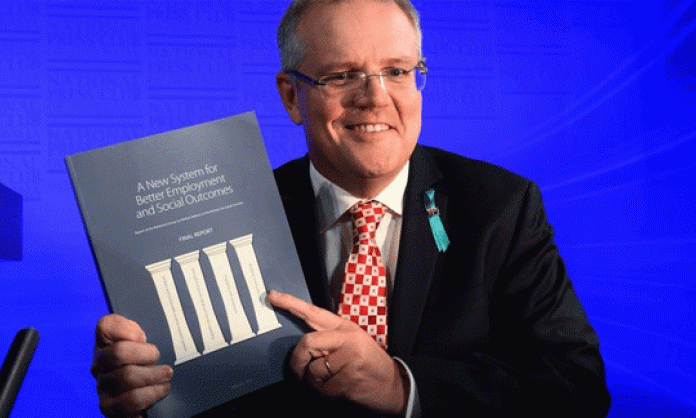The McClure review of the welfare system, commissioned by the government and last week handed down to social services minister Scott Morrison, provides the architecture for a very lean and very mean welfare system. “A new system for better-employment and social outcomes” would more aptly be named, “Sink or swim: a guide to how you don’t deserve a life jacket”.
Four “pillars” provide a strategic and ideological underpinning to the report, in which the words “self reliance” are repeated ad nauseam. Taken as a whole it says that the needs of the labour market are paramount and those who are denied a place within it are defective and will never be worthwhile members of society until they learn to look after themselves.
Pillar one advocates a “simpler and sustainable income support system”. This is the bit where they tell us we need a “passport to work” and that it will “remove the fear people have of taking a job by making it easier to understand the financial rewards of work”. Never mind that the latest figures from the Bureau of Statistics show that there are almost 800,000 people looking for work in Australia – and there are only around 150,00 jobs available. No, people are just scared. They have no idea how having enough money to eat will benefit them.
A simpler system, according to the report, would reduce the numerous current payments to just five, thus eliminating red tape. We’re told it’s about making things simpler and streamlining things. But let’s get real: reducing complexity in the welfare system is about cost cutting, not making the system better at addressing people’s complex needs. Constant references are made to “constraining costs”.
Whilst there is some acknowledgment of the existence of disincentives to work (aside from there not being enough jobs) – such as appalling public housing, poverty, homelessness, disability, and inequality in educational opportunities and serious health problems – the massive funding and total reorientation in government policy required to fix these problems are glossed over with vague general statements about how “early intervention programs” and “services” should be provided to the socially disadvantaged.
The glaring hypocrisy here is that the federal liberal government and its state counterparts are currently undertaking the biggest cuts to community services in Australian history. Which leads to the logic of pillars two, three and four. They are, “Strengthening individual and family capacity”, “Engaging with employers” and “Building community capacity”.
The ideological thrust of these pillars is that governments should relinquish more responsibility for social services and social welfare. Instead, individuals and families – those already struggling to meet their own needs amid rising cost and attacks on penalty rates among other things – are told to be self-reliant. A vision for what that looks like is the US, where working class people don’t miraculously heal themselves from the fountain of self-reliance when they get sick or injured. They just get denied treatment.
The McClure review recommends that when governments do assist families with childcare or social and education services, the assistance should take an “investment approach” in order that there will be an economic “return on investment”.
Concretely, the report suggests people should not be considered “independent” until the age of 22. The age at which you’re allowed to be “self-reliant” may be about to change.
The last two pillars are an exercise in fantasy. They suggest appealing to big business to “change negative attitudes to disadvantaged groups” and to fund the infrastructure required to meet the vast needs of workers with disabilities by offering such irresistible inducements as government “awards”. We’re expected to believe that parasites like Gina Rinehart, who is on record saying that Australian workers have it too good and should be mindful that many people in Africa work for $2 a day, are going to plough billions into helping disadvantaged workers.
Pillar four is like the comedic punch line. This is where they recommend “philanthropy” and “volunteering”. So in a word: charity.
It may not come as a surprise that the government-appointed author of this report made a smooth transition from CEO of Mission Australia to being CEO of Retirement Villages Group within Macquarie Bank. Macquarie became an aggressive player in the health care market, buying up retirement villages and Nursing Homes.
Seems rather fitting for a government hell-bent on taking away what rights and social protections we have, while they stuff the pockets of the rich.









